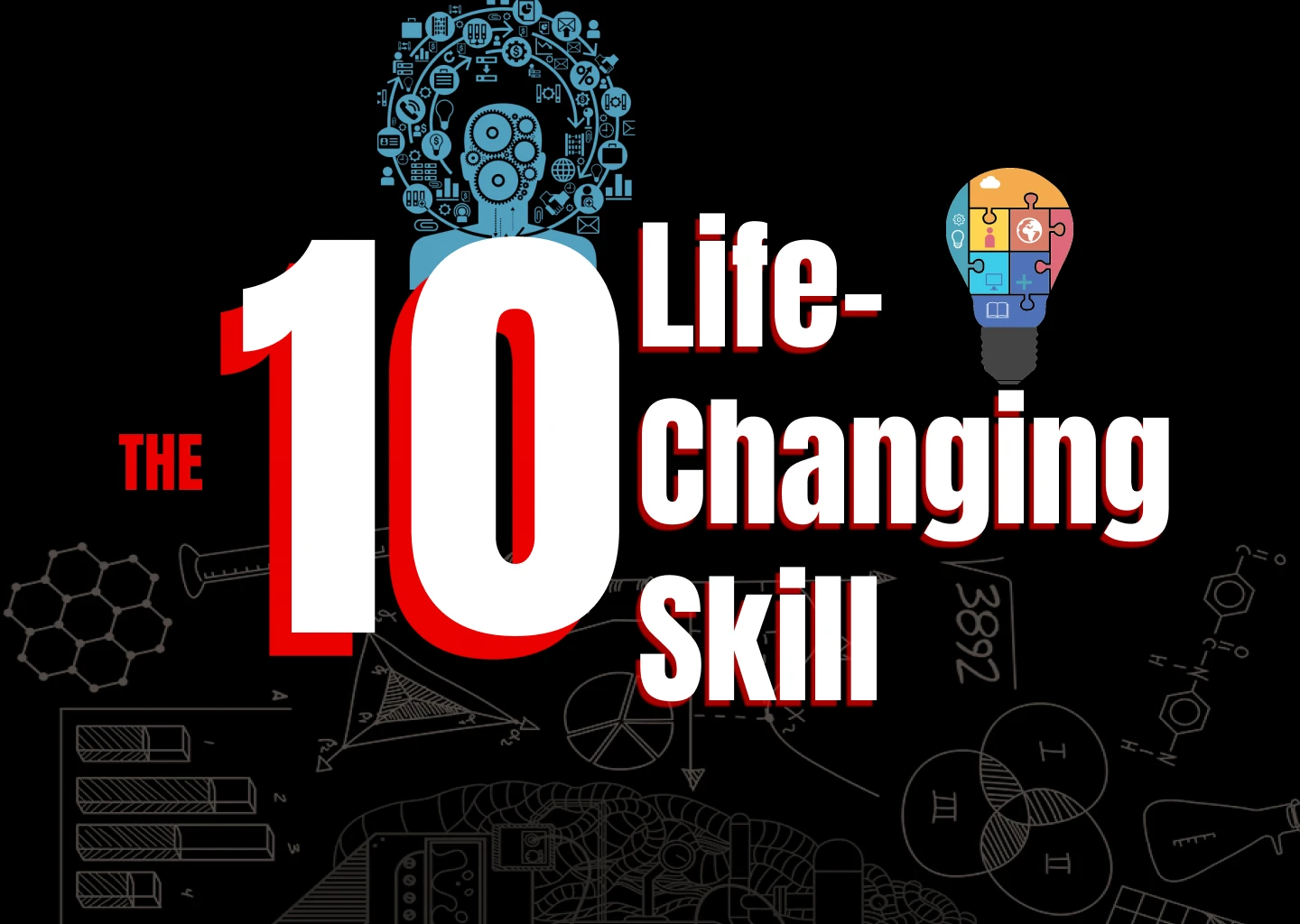
Introduction
- Briefly introduce the concept of life-changing skills and their transformative potential.
- Explain why cultivating these skills can improve both personal and professional life.
- Highlight that the article will cover ten powerful skills, their practical uses, and their benefits.
The Top 10 Life-Changing Skills: Uses and Benefits of Each":
1. Emotional Intelligence (EQ)

- What is Emotional Intelligence?Define EQ as the ability to recognize, understand, and manage emotions in oneself and others.
- Uses of Emotional IntelligenceEnhancing personal relationships through empathy and understanding.Managing stress and emotional responses in challenging situations.Fostering teamwork and positive interactions in professional settings.
- Benefits of Emotional Intelligence
Let’s start with emotional intelligence, often called EQ. You’ve probably heard about IQ—the traditional measure of intelligence—but EQ is all about understanding emotions, both yours and other people’s. It’s like a secret superpower regarding relationships and personal growth.
So, what exactly is Emotional Intelligence? Think of it as a set of skills that help you “read the room,” manage your feelings, and respond thoughtfully instead of just reacting. It means you can tune into what others are feeling, which can make a huge difference when connecting with people, solving conflicts, or even handling a stressful day.
How can Emotional Intelligence be useful? For starters, emotional intelligence helps you understand and express your feelings in a way that others can connect with. Instead of blowing up in a stressful situation, EQ enables you to pause, reflect, and respond more calmly. This can come in handy in all sorts of settings—like managing a heated discussion at work or navigating a tricky conversation with a friend.
In work settings, EQ is a game-changer because it allows you to connect with colleagues, empathize with team members, and resolve conflicts to strengthen relationships. If you’ve ever had that one manager who made everyone feel heard and respected, chances are they had high EQ!
What are the biggest benefits of Emotional Intelligence? The best part about EQ is how it builds strong, lasting connections. People trust you more when you’re emotionally intelligent because they know you “get it.” You can understand their perspectives and even help them work through their emotions. It’s like being that friend who always knows the right thing to say—or at least the right way to listen.
Another benefit is that it reduces conflict and makes tough conversations easier. People with high EQ tend to handle disagreements with empathy, so they can resolve issues before they turn into major problems. And, as a nice bonus, developing EQ also helps you handle your own stress and build resilience. When you’re tuned into your own emotions, you can manage them better, which means fewer meltdowns and more confidence in challenging situations.
2. Time Management

- What is Time Management?Explain time management as organizing and planning how to divide time among activities.
- Uses of Time ManagementPrioritizing tasks and avoiding procrastination.Breaking down large projects into manageable steps.Balancing work and personal life effectively.
- Benefits of Time ManagementIncreases productivity and efficiency.Reduces stress and enhances focus.Creates more time for personal interests and relaxation.
Time management is like having a personal organizer in your brain. It’s all about planning, prioritizing, and making the most of the hours in your day. We all have the same 24 hours, so learning to use them well can make a big difference!
How can Time Management be useful? Time management helps you prioritize what really matters and get things done efficiently. If you’ve ever wished for a few extra hours in the day, time management is the closest you’ll get! It’s essential for staying on top of work, side projects, or even just making sure you have downtime.
What are the biggest benefits of Time Management? It’s simple—better time management means less stress and more productivity. You’ll avoid the last-minute rush and feel more in control of your day. It also gives you more time to focus on things that make you happy, like hobbies, friends, or family.
3. Adaptability and Resilience
- What is Adaptability and Resilience?Define adaptability as the ability to adjust to new conditions and resilience as the ability to recover from setbacks.
- Uses of Adaptability and ResilienceCoping with change in work environments or life events.Overcoming failures and learning from mistakes.Staying calm and focused during stressful situations.
- Benefits of Adaptability and ResilienceBuilds mental strength and positivity.Encourages personal growth and agility.Increases confidence to face life's challenges.
Life throws curveballs, and adaptability and resilience are the skills that help you roll with them. Adaptability is about being open to change, while resilience is the strength to bounce back when things don’t go as planned.
How can Adaptability and Resilience be useful? In a world that’s constantly changing, being adaptable can make or break you. Whether it’s a new job, a big life change, or just unexpected obstacles, these skills help you stay positive and keep going.
What are the biggest benefits of Adaptability and Resilience? Being adaptable means you’re ready for whatever comes your way, and resilience helps you grow through challenges. Together, they build confidence, positivity, and mental strength, so you’re less likely to get knocked down by life’s ups and downs.
4. Effective Communication

- What is Effective Communication?
- Describe communication as the exchange of information, and effective communication as doing so clearly and purposefully.
- Uses of Effective CommunicationArticulating thoughts and ideas with clarity.Practicing active listening and providing constructive feedback.Navigating difficult conversations with diplomacy.
- Benefits of Effective CommunicationBuilds trust and understanding in relationships.Reduces misunderstandings and conflict.Enhances career prospects and leadership abilities.
Communication isn’t just talking; it’s about being clear, listening well, and getting your message across. Good communication is at the heart of strong relationships and is a key skill in the workplace, too.
How can Effective Communication be useful? Whether you’re pitching an idea, giving feedback, or having a heart-to-heart, effective communication lets you express your ideas clearly and really connect with people. It helps in personal life and in any job, especially if you’re working with a team or leading a project.
What are the biggest benefits of Effective Communication? Clear communication builds trust and understanding, reduces conflict, and strengthens relationships. It’s also a huge career booster, as employers value people who can communicate well. Plus, it makes you a better listener, which is just as important as speaking!
5. Problem-solving and Critical Thinking
- What is Problem-Solving and Critical Thinking?Explain these as skills for analyzing issues objectively and finding solutions.
- Uses of Problem-Solving and Critical ThinkingBreaking down complex problems into manageable parts.Making sound decisions in personal and professional settings.Challenging assumptions and thinking creatively.
- Benefits of Problem-Solving and Critical ThinkingEncourages innovation and independence.Leads to better decision-making and fewer errors.Increases resilience in facing unexpected challenges.
Problem-solving and critical thinking are your tools for tackling challenges head-on. These skills let you break down complex issues, analyze options, and come up with solutions.
How can Problem-Solving and Critical Thinking be useful? These skills help you think on your feet and make decisions with confidence. At work, they’re invaluable for tackling tricky projects or resolving issues. In life, they help you deal with anything from daily annoyances to big, unexpected challenges.
What are the biggest benefits of Problem-Solving and Critical Thinking? They help you become more independent and innovative, making it easier to handle whatever comes your way. Plus, being a good problem-solver gives you confidence and peace of mind, knowing you can handle whatever life throws at you.
6. Self-Discipline and Focus
- What is Self-Discipline and Focus?Define self-discipline as the ability to control impulses and focus as the ability to concentrate on a task without distraction.
- Uses of Self-Discipline and FocusSetting and achieving long-term goals by staying committed.Minimizing distractions and staying productive.Building habits that support personal and professional growth.
- Benefits of Self-Discipline and FocusIncreases consistency and productivity.Builds self-confidence and mental clarity.Leads to greater life satisfaction and accomplishment.
Self-discipline and focus are like muscles you can train. Self-discipline helps you stay on track with goals, while focus keeps distractions at bay. Together, they’re key for reaching long-term goals.
How can Self-Discipline and Focus be useful? These skills help you stay committed to your goals, whether it’s sticking to a fitness routine, completing a project, or learning a new skill. They also help you focus on what’s important and avoid getting sidetracked.
What are the biggest benefits of Self-Discipline and Focus? With these skills, you’ll accomplish more, feel more in control, and build confidence. Self-discipline and focus help you feel motivated and satisfied with the progress you’re making toward your goals.
7. Financial Literacy
- What is Financial Literacy?Describe financial literacy as the understanding of personal finance principles such as saving, investing, and budgeting.
- Uses of Financial LiteracyCreating and sticking to a personal or family budget.Making informed financial decisions about spending and investments.Managing debt and planning for future financial goals.
- Benefits of Financial LiteracyProvides financial security and reduces money-related stress.Opens up opportunities for wealth-building.Enables a sense of control over financial future.
Financial literacy is all about understanding money—how to budget, save, invest, and manage debt. It’s a must-have skill for anyone who wants to feel secure and in control of their finances.
How can Financial Literacy be useful? With good financial literacy, you can make smart decisions about spending and saving. It helps you avoid debt traps, build wealth over time, and plan for the future.
What are the biggest benefits of Financial Literacy? Financial literacy brings peace of mind and freedom. Knowing how to manage your money means less stress, more control, and the possibility of achieving financial independence. Plus, it opens up options for investing and growing wealth.
8. Learning and Unlearning
- What is Learning and Unlearning?Define learning as acquiring new knowledge and unlearning as letting go of outdated ideas or habits.
- Uses of Learning and UnlearningStaying current in fast-changing industries or areas of interest.Updating personal beliefs and habits that no longer serve.Expanding personal and professional horizons by embracing new skills.
- Benefits of Learning and UnlearningKeeps the mind agile and adaptable.Fosters personal growth and evolution.Enhances problem-solving and creativity.
Learning is picking up new skills and knowledge, while unlearning is letting go of old ideas that no longer serve you. Together, they keep you growing and adapting.
How can Learning and Unlearning be useful? These skills help you stay flexible and open-minded, which is especially important in today’s fast-paced world. Whether you’re switching careers, learning a new hobby, or adjusting your beliefs, learning and unlearning help you keep up with change.
What are the biggest benefits of Learning and Unlearning? They make life exciting and fulfilling by keeping your mind agile. These skills open up new opportunities and help you grow personally and professionally.
9. Networking and Relationship-Building
- What is Networking and Relationship-Building?Explain networking as connecting with others for mutual benefit and relationship-building as nurturing these connections.
- Uses of Networking and Relationship-BuildingCreating professional connections that lead to career opportunities.Building a support system for advice and mentorship.Expanding personal influence and reputation.
- Benefits of Networking and Relationship-BuildingOpens doors to new opportunities and collaborations.Provides emotional and career support.Builds a reliable network of like-minded individuals.
Networking and relationship-building are all about connecting with others in a meaningful way. Whether it’s for a career or friendship, these skills can enrich your life and open doors.
How can Networking and Relationship-Building be useful? Networking isn’t just about swapping business cards—it’s about forming genuine connections. Good relationships can lead to job offers, collaborations, mentorships, and a strong support network.
What are the biggest benefits of Networking and Relationship-Building? These connections offer emotional support, career opportunities, and friendship. A solid network can be invaluable when you’re looking for advice, facing challenges, or simply looking for inspiration.
10. Healthy Lifestyle Habits
- What are Healthy Lifestyle Habits?Define these as routines and behaviors that promote physical, mental, and emotional well-being.
- Uses of Healthy Lifestyle HabitsMaintaining physical fitness and mental clarity through regular exercise and mindfulness.Supporting long-term health through a balanced diet and adequate sleep.Enhancing productivity and mood by prioritizing self-care.
- Benefits of Healthy Lifestyle HabitsBoosts energy, focus, and resilience.Reduces the risk of illness and enhances longevity.Increases happiness and life satisfaction.
Healthy lifestyle habits, like eating well, exercising, and sleeping enough, are foundational for physical and mental health. They give you the energy and resilience to pursue your goals.
How can Healthy Lifestyle Habits be useful? Good habits keep you physically strong, mentally sharp, and emotionally balanced. They help you feel your best, so you can give your best to whatever you’re working on.
What are the biggest benefits of Healthy Lifestyle Habits? A healthy lifestyle boosts mood, reduces stress, and increases energy. It can help you live longer, happier, and with a greater sense of well-being, making it easier to face challenges and pursue your passions.
Conclusion
- Summarize the value of developing these life-changing skills and their broad-reaching impact.
- Encourage readers to begin with one or two skills and build over time, emphasizing that small, consistent efforts lead to significant, lasting change.
- Reiterate that mastering these skills can improve relationships, career success, and overall quality of life.
